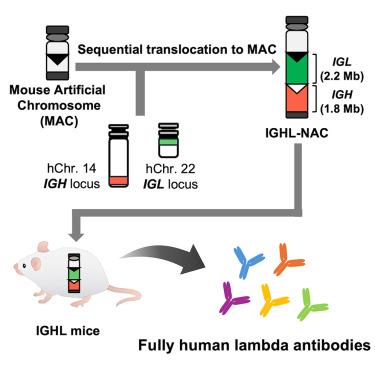携带全长人类免疫球蛋白基因座的小鼠产生带有λ轻链的抗原特异性人类抗体
IF 4.6
2区 综合性期刊
Q1 MULTIDISCIPLINARY SCIENCES
引用次数: 0
摘要
通过动物免疫法开发抗体药物通常需要对宿主抗体进行人源化处理,以解决对人类免疫原性的担忧。然而,采用能够产生人类抗体的动物模型则为开发抗体药物提供了无需人源化的机会。尽管人类免疫球蛋白(Ig)κ和Igλ的使用比例约为60%:40%,但大多数获批的抗体治疗药物都是卡帕抗体,而作为治疗药物的λ抗体的开发却相对滞后。因此,在这项研究中,我们利用小鼠人工染色体(MAC)载体培育了携带IGH和IGL基因座(IGHL)的小鼠,它们能产生人类λ抗体。我们证明,IGHL小鼠能跨代持续保留整合在MAC上的人类λ抗体基因座,并能在抗原刺激下诱导产生特异性抗体。这些发现为开发λ抗体药物提供了一个前景广阔的平台,而λ抗体药物在历史上一直被忽视。本文章由计算机程序翻译,如有差异,请以英文原文为准。

Mice carrying the full-length human immunoglobulin loci produce antigen-specific human antibodies with the lambda light chain
The development of antibody drugs through animal immunization typically requires the humanization of host antibodies to address concerns about immunogenicity in humans. However, employing an animal model capable of producing human antibodies presents the opportunity to develop antibody drugs without the need for humanization. Despite the ratio of human immunoglobulin (Ig) κ to Igλ usage being approximately 60%:40%, the majority of approved antibody therapeutics are kappa antibodies, and the development of lambda antibodies as therapeutic agents has lagged behind. Therefore, in this study, we developed mice carrying the IGH and IGL loci (IGHL), which can produce human lambda antibodies, using mouse artificial chromosome (MAC) vectors. We demonstrated that IGHL mice consistently retain the human lambda antibody locus integrated on the MAC across generations and can be induced to produce specific antibodies upon antigen stimulation. These findings provide a promising platform for advancing lambda antibody drugs, which have historically been neglected.
求助全文
通过发布文献求助,成功后即可免费获取论文全文。
去求助
来源期刊

iScience
Multidisciplinary-Multidisciplinary
CiteScore
7.20
自引率
1.70%
发文量
1972
审稿时长
6 weeks
期刊介绍:
Science has many big remaining questions. To address them, we will need to work collaboratively and across disciplines. The goal of iScience is to help fuel that type of interdisciplinary thinking. iScience is a new open-access journal from Cell Press that provides a platform for original research in the life, physical, and earth sciences. The primary criterion for publication in iScience is a significant contribution to a relevant field combined with robust results and underlying methodology. The advances appearing in iScience include both fundamental and applied investigations across this interdisciplinary range of topic areas. To support transparency in scientific investigation, we are happy to consider replication studies and papers that describe negative results.
We know you want your work to be published quickly and to be widely visible within your community and beyond. With the strong international reputation of Cell Press behind it, publication in iScience will help your work garner the attention and recognition it merits. Like all Cell Press journals, iScience prioritizes rapid publication. Our editorial team pays special attention to high-quality author service and to efficient, clear-cut decisions based on the information available within the manuscript. iScience taps into the expertise across Cell Press journals and selected partners to inform our editorial decisions and help publish your science in a timely and seamless way.
 求助内容:
求助内容: 应助结果提醒方式:
应助结果提醒方式:


